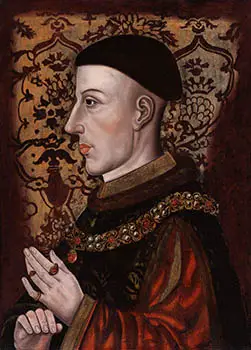Henry V
Henry V was King of England during the early 15th century. He belonged to the House of Lancaster and was the second English monarch from the family. His reign was comparatively short but his achievements were great.
Henry inherited a weakened country from his father but through his able leadership and military prowess made England a dominant force in the region. He is ranked high among English kings by most of the historians for his leadership and administrative qualities. His sudden and untimely death undid a lot of his hard work as England then had to go through an unsettling minority rule by his infant son, Henry VI.


Early Life: Henry V was born on August 9, 1386 in Monmouth Castle, Wales. His father Henry IV (then Henry Bolingbroke) was son of John the Gaunt, 1st Duke of Lancaster. He later became King of England as well. His mother was Mary de Bohun. In 1398, Henry’s father was sent in exile by Richard II, the English King at the time.
Richard took young Henry in his charge and was very kind to him. In 1399, Richard II was overthrown by Lancastrian army and its allies and Henry’s father was crowned as King of England. Henry V was appointed as heir apparent and Duke of Lancaster after his father’s coronation. He then spent some time studying in Queens College in Oxford. By 1403, Henry V had gained a respectable position in the English military and led his forces against Welsh ruler Owain Glyndwr.
He also assisted his father in Battle of Shrewsbury against Harry Hotspur. Henry was severely injured in the battlefield when he was struck by an arrow in his face. He however; recovered from the life threatening wound. In 1410, Henry IV fell ill and Henry V ruled for eighteen months. He made significant changes in policies and took independent decisions. Henry IV upon his recovery reversed most of his decisions and even expelled his son from the council.
This was the start of differences between the father son duo on matters pertaining to politics and foreign policy.
 Reign: Henry IV died in 1413 and was succeeded by his son. Henry V was crowned on March 21, 1413. He made it very clear from the very beginning that he intended to rule a united country. He followed the path of reconciliation in some cases and restored honor and authority of certain nobles who had suffered during his father’s reign. However, if Henry saw rebellious streak somewhere, he acted swiftly to quell it down.
Reign: Henry IV died in 1413 and was succeeded by his son. Henry V was crowned on March 21, 1413. He made it very clear from the very beginning that he intended to rule a united country. He followed the path of reconciliation in some cases and restored honor and authority of certain nobles who had suffered during his father’s reign. However, if Henry saw rebellious streak somewhere, he acted swiftly to quell it down.
During the early years of his reign he faced a serious revolt called Lollard rising in 1414 but he successfully and ruthlessly put it down. Henry’s eyes were set on France and he demanded possession of Aquitaine, Normandy, Maine and Touraine. He wanted return of all territories ceded by French during Treaty of Calais in 1360. His claims were not taken seriously by Charles VI. Henry was however, convinced of the legality of his claims and was prepared to go to any limit for their fulfillment. Henry V’s great leadership was instrumental in military victories that he secured subsequently against France in the ongoing Hundred Years War.
He earned his famous victory in Battle of Agincourt in 1415 which opened gates for several smaller victories against France. By 1420, French realized that Henry held the upper hand in the war. In 1420, the two sides signed Treaty of Troyes. Henry V was accepted as heir to the French throne and Regent of France. He was also given hand of Catherine, daughter of Charles VI in marriage.

Later Life and Death: However, his victory was short lived as Henry’s health deteriorated after this victory. He fell seriously ill during the sieges of Melun and Meaux. Eventually he died of camp fever in Chateau of Vincennes on August 31, 1422.
His nine months old son Henry VI succeeded him.




